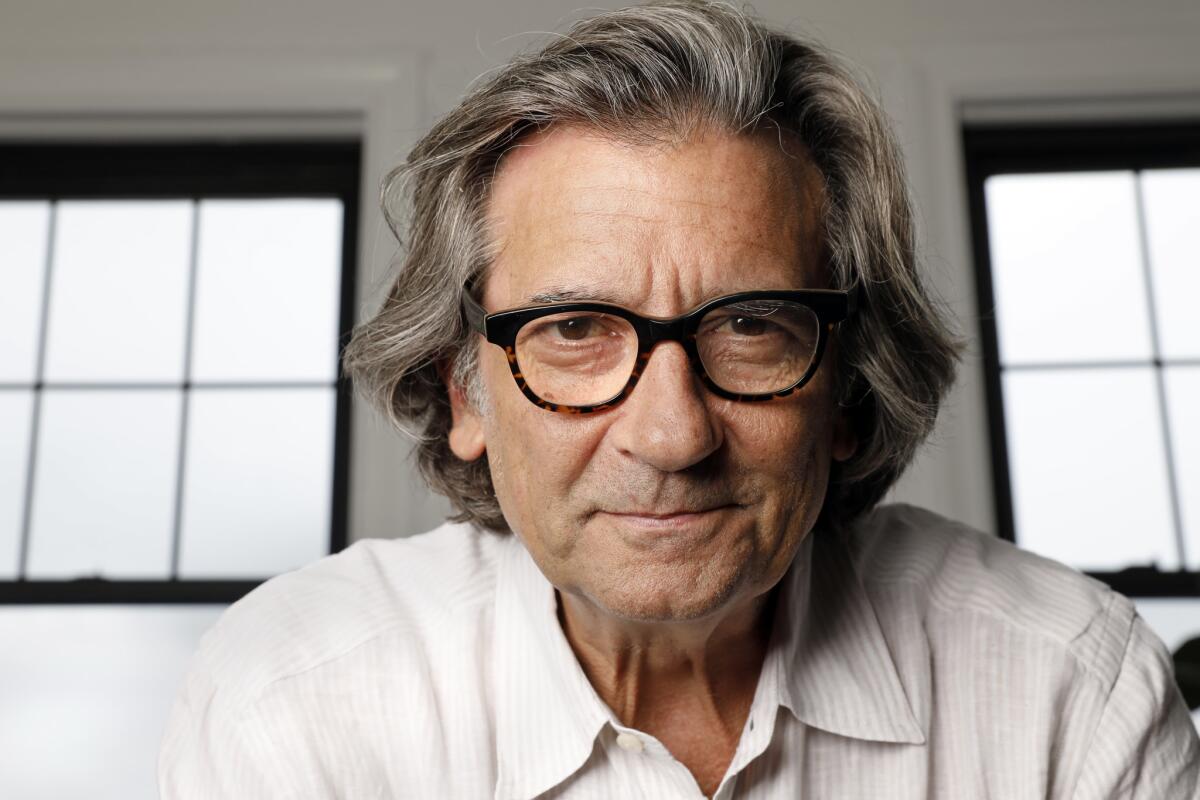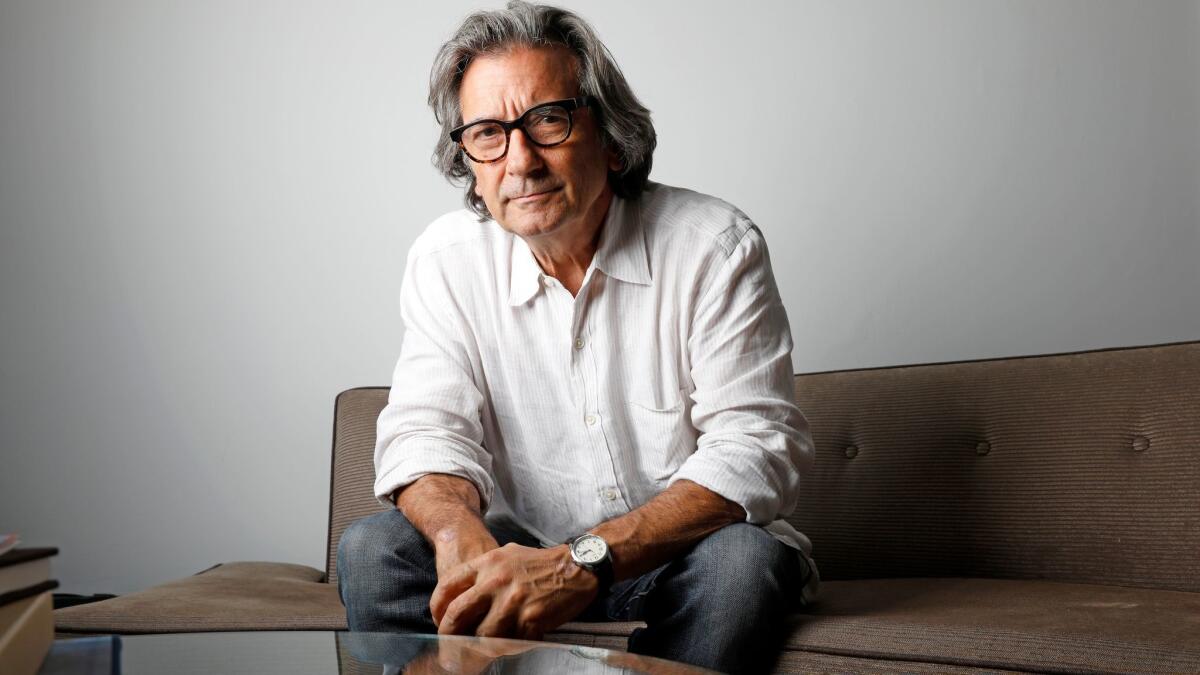Griffin Dunne chronicles the life and work of his aunt, Joan Didion

Reporting from New York — Griffin Dunne hadn’t always planned to make a film about his aunt, the celebrated essayist and novelist Joan Didion. But when they collaborated on a trailer for her 2011 memoir, “Blue Nights,” he realized Didion was long overdue for the documentary treatment.
“I asked her and from the moment she said yes, I said oh boy, I’m in for it now. This person means a lot to a lot of people,” recalls Dunne over the course of lunch at a Ukrainian diner near his downtown apartment. The years-long labor of love, aided by a Kickstarter campaign, has finally resulted in “Joan Didion: The Center Will Not Hold,” arriving Friday on Netflix.
The actor-director-producer has created a sometimes surprising portrait of an author known for writing about the cultural disintegration of the ’60s and ’70s and, more recently, the deaths of her husband and daughter. “She laughs a lot, she’s really funny — that was always something really important to me to show rather than ‘the queen of darkness,’” he says.
As the film captures, Dunne grew up surrounded by bold-faced names. His father was TV producer turned writer Dominick Dunne, who chronicled high-society crime in the pages of Vanity Fair. His uncle (and Didion’s husband) was novelist John Gregory Dunne. That carpenter who fixed up Aunt Joan’s Malibu deck one summer? Some guy named Harrison Ford.
Dunne, who rose to fame in “An American Werewolf in London” and “After Hours,” has been on a roll of late in a number of other streaming projects. He appeared in “I Love Dick” for Amazon this year and is now filming “Gore,” about another famed writer, Gore Vidal, for Netflix.
What were your impressions of your aunt growing up?
It was almost impossible to think of Joan as a separate entity, because they were John and Joan. I rarely saw them separately, it was always like talking to two people. As a teenager, I was too intimidated to have a writing discussion with Joan. “When you say ‘things fall apart,’ what do you mean, Aunt Joan?” That was not a conversation I was ready to have. I remember once attempting it, asking Joan, “What are you writing?” She looked at me funny and in the beat of silence was broken by John yelling from the other end of the room: “You never ask a writer what they’re writing!” Decades later, I understood why that is. “If I could tell you what my book is about there’d be no point in writing it.” She writes to know what she thinks.
What’s the first thing she wrote that you really remember making an impression on you?

[Joan Didion] made me think about journalism and writing in a way I hadn’t before, that you could capture the feeling of a decade and a sense of place.
— Griffin Dunne
“The White Album.” That one I think I read in galleys. At Christmas we’d get first editions of whatever book either of them had out and it would be inscribed. Now I have all those and all the ones written to my sister and parents. Unlike “Slouching Towards Bethlehem,” where she was talking about the Haight in ‘67, with “The White Album,” I had the Doors’ and Joplin’s records on my bookshelf, the Sharon Tate murders happened right up the street. I felt involved somehow in all of the things that she was describing. She made me think about journalism and writing in a way I hadn’t before, that you could capture the feeling of a decade and a sense of place.
Were you nervous about showing her the film first time?
Oh yeah. I showed her a three-hour cut. I thought what if she just hates it — or worse, it bores her. I think she allowed me to make it because I was her nephew, but not in a nepotistic way. She also knew I was a director. She watches films and she knew exactly what she didn’t want — something dry, academic, obsequious. And she knew she wouldn’t get that from me, because if you’re making a movie about somebody you’ve known all your life, you’re going to have a different take.
Did she give you any notes? I bet she gives great notes.
She does. I’ve showed her early cuts of movies I’ve directed, and I will get pages of typewritten notes. So I expected that and was prepared for whatever. I’m her nephew more than a muckraking documentarian, so whatever she didn’t want or disturbed her, I would have totally taken out. But if she said it on camera, she owned it. She’s just as tough on herself as she is on [Dick] Cheney. She doesn’t have any sort of regret. I think she was very moved by the movie.
Is there anything you learned about her in the process of making it?
I read all her books in order, not just books, articles too, which start with [the Vogue essay] “On Self-Respect,” which she wrote maybe when she was 22, 23. What struck me was how little she changed. She arrived in New York fully formed, and formed not as a New Yorker but as a Californian, as a descendant of homesteaders and with the practicality of being from a family that said no, we’re not going to take the shortcut. You Donners, you take that. We’re staying with the map.
I’ve come to see that Joan has always been a person that everyone worries about. It’s been like that for a long time but the other thing I learned is why she’s outliving everyone. She’s strong. And not just tough-minded, gimlet-eyed, shrewd. Just formidably strong.
You also shared a wonderful moment with Carrie Fisher in the documentary “Bright Lights.” Tell me about your friendship.
[When I was 16], my younger brother, Alex, came home and said, “I have just met the most amazing girl, Griffin. Stay away from her.” And this girl came in, really beautiful but really funny. We just really made each other cry with laughter. It was love at first sight — friendship love. We both were witness to each other’s greatest and worst moments.
We were roommates in New York for a long time. I was a popcorn concessionaire at Radio City Music Hall while she was off acting in a movie in England. She’d call me in the middle of the night from London. I’d go, “How’s the movie?” She’d say, “It’s the stupidest piece of crap ever. I’m running around with a big monkey.” “What’s it called again?” “’Star Wars.’”
And then I went with Carrie to the very first screening at the Ziegfeld. By this time I’d moved up to being a waiter at Beefsteak Charlie’s. We’re in this theater and I went, well, life is never going to be the same. The next thing I know it’s James Taylor and Paul Simon and I’m counting my tips from Beefsteak Charlie’s.
You just starred in “I Love Dick.” Everyone who works with Jill Soloway talks about the unusual process she has on set.
It is like camp. I think Kevin [Bacon] and I were the oldest people on the set and had certainly been acting longer than everyone by a long shot. We would look at each other with big grins on our faces, this is just like acting school. It wasn’t done in any cynical way. This is the excitement we felt when we were starting out that people try to beat out of you over the years. Her whole thing is just about being emotionally safe, where there’s no mistakes, you’re free to try anything. So it was great.
What would your father, who covered the O.J. Simpson trial, make of the revived interest in the case?
He’d be disgusted [by Simpson’s release]. I think he would have really dug the doc [“O.J.: Made in America”] and he really would have enjoyed the series [“The People v. O.J. Simpson: American Crime Story”]. You know they asked me to play him before they cast [Robert] Morse, but that was just too weird.
Overtime
I finished reading “Hue 1968” in anticipation of the Ken Burns Vietnam doc and started a very disturbing novel in memoir form from an S.S. officer called “The Kindly Ones.” Listening to a band I somehow overlooked until yesterday The Modern Lovers who have a Velvet Underground/Ramones kind of sound and just finished the “You Must Remember This” podcast series about Jane Fonda and Jean Seberg.
ALSO:
Review: Joan Didion gets out of town in ‘South and West’ — and finds only fragments
Classic Hollywood: Griffin Dunne rediscovers acting after directing
More to Read
Only good movies
Get the Indie Focus newsletter, Mark Olsen's weekly guide to the world of cinema.
You may occasionally receive promotional content from the Los Angeles Times.










